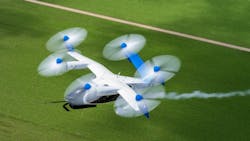Hydrogen-Electric VTOL Demo Shows Potential for Emissions-Free Flight
What you'll learn:
- Operating procedure of Joby's hydrogen-electric air taxi demonstrator.
- Where the VTOL taxi intends to fly.
- Details of Joby's ElevateOS software tool suite instrumental for on-demand taxi service.
Joby Aviation Inc., a company developing electric air taxis for commercial passenger service, successfully flew a first-of-its-kind hydrogen-electric air taxi demonstrator over 523 miles, and water was the only by-product. The vertical take-off and landing (VTOL) aircraft builds on the company’s battery-electric air taxi development program, demonstrating the potential for hydrogen to unlock emissions-free, regional journeys that don’t require a runway.
The hydrogen-electric program builds on technology developed by Joby subsidiary H2FLY, acquired in 2021, and forms part of the company’s future technology roadmap. The flight demonstrates the potential for emissions-free regional travel. Commercial operations are expected to commence as soon as 2025 using the battery-electric air taxi.
Air Taxi Service Plans
Joby intends to operate its aircraft in the U.S. markets, including New York City and Los Angeles alongside partner Delta Air Lines, and in the United Arab Emirates, where the company has a six-year exclusive agreement to provide air taxi services in Dubai.
It will also partner with local operators in certain overseas geographies, as well as support direct sales of the aircraft to business customers such as Mukamalah, the aviation arm of Saudi Aramco, and to potential government partners like the U.S. Department of Defense.
The electric air taxi is designed to carry a pilot and four passengers at speeds of up to 200 mph. JoeBen Bevirt, Founder and CEO of Joby, said, “Traveling by air is central to human progress, but we need to find ways to make it cleaner. With our battery-electric air taxi set to fundamentally change the way we move around cities, we’re excited to now be building a technology stack that could redefine regional travel using hydrogen-electric aircraft.
“The vast majority of the design, testing, and certification work we’ve completed on our battery-electric aircraft carries over to commercializing hydrogen-electric flight. In service, we also expect to be able to use the same landing pads, the same operations team, and Joby’s ElevateOS software that will support the commercial operation of our battery-electric aircraft.”
How the VTOL Demonstrator Came Together
The test flight, believed to be the first forward flight of a VTOL aircraft powered by liquid hydrogen, was completed using a converted Joby pre-production prototype battery-electric aircraft fitted with a liquid-hydrogen fuel tank and fuel cell system. It landed with 10% of its hydrogen fuel load remaining.
Joby’s hydrogen-electric demonstrator is the result of several years of collaboration between a small team at Joby and H2FLY, Joby’s wholly-owned subsidiary based in Stuttgart, Germany. The converted aircraft previously completed more than 25,000 miles of testing as a battery-electric aircraft at the company’s base in Marina, Calif.
Using the same airframe and overall architecture as Joby’s core battery-electric aircraft, this demonstrator features a liquid-hydrogen fuel tank that stores up to 40 kg of liquid hydrogen, alongside a reduced mass of batteries. Hydrogen is fed into a fuel-cell system, designed and built by H2FLY, to produce electricity, water, and heat.
The electricity produced by the hydrogen fuel cell powers the six electric motors on the aircraft. The batteries provide additional power primarily during take-off and landing.
The ElevateOS Tool Suite
Joby has also received Federal Aviation Administration authorization to use a suite of software tools developed in-house. Called “ElevateOS,” it’s designed to enable on-demand air taxi operations.
The ElevateOS operating system includes pilot tools, operations and schedule management software, a rider app, and matching engine similar to those used by ride-hailing apps today. It pairs passengers with available aircraft and landing infrastructure to deliver efficient journeys.
Joby plans to use ElevateOS to support its own air taxi operations. It will also make the software available to selected partners who purchase the aircraft, as part of a wider services package.
Among other preparations Joby is making to support the launch of commercial air taxi operations are pilot training and the simulation of its planned air taxi service using a conventional aircraft that carries the same number of passengers as Joby’s aircraft.
Utilizing a Part 135 Air Carrier Certificate granted by the Federal Aviation Administration more than two years ago, the company has already been able to apply its ElevateOS software to test core aspects of its planned operations, including:
- Offering Joby team members an on-demand passenger service, enabling them to book flights with free choice of timing, origin and destination via its rider app.
- Matching passengers with similar routes to each other, using automation tools.
- Taking payments from Joby team members and external customers for whole-aircraft chartered flights.
- Integrating the use of the Joby pilot app, rider app, and back-end operational software.
“The air taxi service we plan to deliver isn’t like any sort of air travel that’s existed before,” said Eric Allison, Chief Product Officer at Joby and former Head of Uber Elevate. “We expect travelers to book on-demand and to be boarding an aircraft just minutes later, much like the experience of using ground-based ridesharing today. That required us to totally rethink the software and the operations of these aircraft. We’ve built ElevateOS from the ground up to enable high-tempo, on-demand flights that will deliver true time savings and seamless mobility to customers.’’
Joby has developed an aircraft-specific training course that prepares qualified commercial pilots to fly the aircraft in about six weeks. In addition, the company has already begun offering private pilot training and ground school as part of its future pilot training academy.
